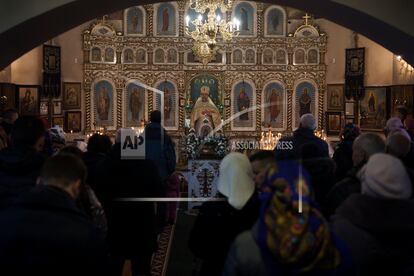Ukraine moves official Christmas Day holiday to Dec. 25, denouncing Russian-imposed traditions
President Volodymyr Zelenskiy signed a law moving the holiday, citing ‘the desire of all Ukrainians to live their lives with their own tradition’

Ukraine’s President Volodymyr Zelenskiy on Friday signed a law moving the official Christmas Day holiday to Dec. 25 from Jan. 7, the day when the Russian Orthodox Church observes it.
The explanatory note attached to the law said its goal is to “abandon the Russian heritage,” including that of “imposing the celebration of Christmas” on Jan. 7, and cited Ukrainians’ “relentless, successful struggle for their identity” and “the desire of all Ukrainians to live their lives with their own traditions, holidays,” fueled by Russia’s 17-month-old aggression against the country.
Last year, some Ukrainians already observed Christmas on Dec. 25, in a gesture that represented separation from Russia, its culture and religious traditions.
The law also moves the Day of Ukrainian Statehood to July 15 from July 28, and the Day of Defenders of Ukraine to Oct. 1 from Oct. 14.
The Russian Orthodox Church, which claims sovereignty over Orthodoxy in Ukraine, and some other Eastern Orthodox churches continue to use the ancient Julian calendar. Christmas falls 13 days later on that calendar, or Jan. 7, than it does on the Gregorian calendar used by most church and secular groups.
The Catholic Church first adopted the modern, more astronomically precise Gregorian calendar in the 16th century. Protestants and some Orthodox churches have since aligned their own calendars for the purpose of calculating Christmas and Easter.
Ukraine’s religious landscape has fractured for years. There are two branches of Orthodox Christianity in the country, one aligned with the Russian church, even as it enjoys broad autonomy, the other completely independent of it. The Orthodox Church of Ukraine, the branch that is separate from the Russian church, announced earlier this year that it was switching to the Revised Julian calendar, which marks Christmas on Dec. 25.
Its leadership last year allowed believers to celebrate the holiday on Dec. 25.
Russia’s state news agency RIA Novosti reported on Saturday that the rival Orthodox Church, which is aligned with the Russian Orthodox Church, vowed to continue observing Christmas on Jan. 7.
Zelenskiy on Saturday traveled to the war-torn Donetsk region in eastern Ukraine, which Russia has illegally annexed, but only partially occupies, and met with members of the country’s Special Operation Forces. Zelenskiy noted in an online statement that Saturday marks their official day of recognition and also the anniversary of the deadly attack on the Olenivka prison in the Russian-held part of the region, in which dozens of prisoners of war were killed.
Russia and Ukraine accused each other of the attack, with both sides saying that the assault was premeditated in a bid to cover up atrocities. A United Nations fact-finding mission requested by Russia and Ukraine was sent to investigate the killings, but the team was disbanded in January 2023 due to security concerns.
Zelenskiy described the attack as one of Russia’s “most vile and cruel crimes” in a video statement Saturday.
Sign up for our weekly newsletter to get more English-language news coverage from EL PAÍS USA Edition
Tu suscripción se está usando en otro dispositivo
¿Quieres añadir otro usuario a tu suscripción?
Si continúas leyendo en este dispositivo, no se podrá leer en el otro.
FlechaTu suscripción se está usando en otro dispositivo y solo puedes acceder a EL PAÍS desde un dispositivo a la vez.
Si quieres compartir tu cuenta, cambia tu suscripción a la modalidad Premium, así podrás añadir otro usuario. Cada uno accederá con su propia cuenta de email, lo que os permitirá personalizar vuestra experiencia en EL PAÍS.
¿Tienes una suscripción de empresa? Accede aquí para contratar más cuentas.
En el caso de no saber quién está usando tu cuenta, te recomendamos cambiar tu contraseña aquí.
Si decides continuar compartiendo tu cuenta, este mensaje se mostrará en tu dispositivo y en el de la otra persona que está usando tu cuenta de forma indefinida, afectando a tu experiencia de lectura. Puedes consultar aquí los términos y condiciones de la suscripción digital.








































